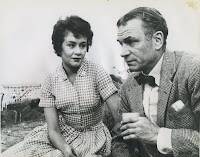Robert here, with my series Distant Relatives, where we look at two films, (one classic, one modern) related through a common theme and ask what their similarities and differences can tell us about the evolution of cinema.
Angry Old Men
As a society we have such a strange relationship with celebrities. We admire them and we despise them. We love when they fail, embarrassing humiliation and then we promise to celebrate their comeback. For the person who has actually attained fame, there's a good chance that that fame will come to an end before they do. At some point society won't have a place for them anymore. Filmmakers seem naturally attracted to the stories of these people since their world, for good or bad, is eternally rooted in the hype of fame.
Tony Richardson's The Entertainer and Darren Aronofsky's The Wrestler are two outside-of-Hollywood films with two very outside-of-Hollywood subjects. Archie Rice of the somewhat-forgotten (or at least under-loved) The Entertainer is an old music hall performer, a song and dance man in a world where rock and roll is the only song and dance anyone seems to care about any more. His audience is small and unenthusiastic. Randy the Ram's audience is enthusiastic. He's got small crowds cheering for him every week as he makes the rounds of the local underground wrestling scene. The audience cheers for blood and bruises. They cheer for Randy out of nostalgia for a time when Randy had full arenas packed just to see him entertain.
 See the Resurrection
See the ResurrectionTwo men trying desperately to hold onto a time when they mattered, growing old, living paycheck to paycheck or not even. At the start Randy seems to have a better deal. He's at least part of a community (though most of his fellow underground wrestlers are young guys trying to get where he once was), he has a haunt in the local strip club and a tenuous connection with fellow over-the-hill dancer Cassidy. Living in a trailer park isn't preferred but he plays with the local kids and he has people who cheer for him. Archie Rice does not. And while he can often be found throwing one or many back among laughing cohorts, it's an attempt to recapture the good old days and numb the present ones. They are not really his friends. Both men are estranged from their families with particular attention payed to their relationships with their daughters. Archie's is sympathetic but disappointed. Randy's is jaded. The father/daughter relationship is often plastered with "daddy's little girl" cliches. Maybe we're meant to think that here, or maybe not. Certainly we're given a glimpse into what could be.
Naturally there's a comeback opportunity that is not to be. It seems unfair to breeze over the big chance for these men but it's a foregone conclusion that it can never be. The entertainment industry demands change or death and these men, so desperate to matter again, aren't evolving but trying to pull their worlds back into the past with them. Then again, the evolution that the world demands of these men is far from ideal. Archie's best prospects are in Canada where he has an opportunity to run a hotel. For Randy it's the deli counter of his local grocer, waiting on grumpy, particular seniors. It's no surprise that Randy chooses to put his health at risk to fulfill his comeback, just as Archie stakes his financial future and risk of prison time on his. The choice that these men have really isn't a choice at all.
We Had Faces Then
There is one woman whose shadow looms large over these two men. She is the patron saint of washed up performers, or perhaps since we're talking in terms of relatives, their mother. Norma Desmond is the original doomed performer though she's a villain; as time goes on, these characters get more and more tuned to our sympathies. Desmond is such a villain that her film needs a hero. Archie Rice isn't a villain but he's quite hurtful to those who love him. He's given up trying. Randy the Ram too screws up and often, but we get the sense that he's trying, he just can't overcome his own nature.
Randy's likability and the severity of his ultimate fate presents us with the biggest emotional blow of any of these characters. Perhaps as time goes on, these kinds of stories must get more painful to make us take notice. Or perhaps writer Robert Siegel has noticed how fatalistic celebrity culture has become. All three films inhabited by these characters end with a death. Perhaps it's the death of hype, or old Hollywood or British reign (as has been speculated in the case of The Entertainer). Either way, the past dies. And so does the roar of the crowd.








2 comments:
you know i never in a million years would have connected norma desmond to randy the ram but i'm glad someone did.
Really interesting. As much as I'd love that Red Shoes to Withnail and I thing I suggested to happen eventually, you're always insightful. (Though Metropolis to Brazil could be a very interesting analysis, even if it's pretty obviousm to link the two.)
Post a Comment